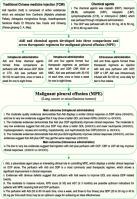Phytomedicine ( IF 6.7 ) Pub Date : 2023-04-30 , DOI: 10.1016/j.phymed.2023.154847 Cheng-Qiong Wang 1 , Jiao Xu 1 , Hong Jiang 1 , Xiao-Tian Zheng 1 , Yan Zhang 1 , Xiao-Rong Huang 2 , Fei She 1 , Teng-Yang Fan 3 , Lin Zhan 4 , Ji-Hong Feng 5 , Qi-Hai Gong 6 , Xue Xiao 1 , Xiao-Fan Chen 7 , Zheng Xiao 1

|
Introduction
Aidi injection (Aidi), a traditional Chinese medicine injection, is often practiced to control malignant pleural effusion (MPE).
Objectives
We performed a registered systematic review and meta-analysis (PROSPERO: CRD42022337611) to clarify the clinical role of Aidi in MPE, reveal optimal combinations of Aidi and chemical agents, their indications, therapeutic route and usage, and demonstrate their clinical effectiveness and safety.
Methodology
All randomized controlled trials (RCTs) about Aidi in controlling MPE were collected from Chinese and English databases (up to October 2022). We clustered them into multiple homogenous regimens, evaluated the risk-of-bias at outcome level using a RoB 2, extracted and pooled the data using meta-analysis or descriptive analysis, and finally summarized their evidence quality.
Results
All 56 studies were clustered into intrapleural administration with Aidi alone or plus chemical agents, and intravenous administration with Aidi for MPE. Intrapleural administration with Aidi alone displayed similar clinical responses on Cisplatin (DDP) alone. Only administration with Aidi plus DDP significantly improved complete response and quality of life, and displayed a low pleurodesis failure, disease progression, hematotoxicity, gastrointestinal and hepatorenal toxicity. For patients with moderate to massive effusion, Karnofsky Performance Status score ≥ 50 or anticipated survival time ≥3 months, Aidi (50 ml to 80 ml each time, one time each week and three to eight times) plus DDP (20 to 30 mg, 40 to 50 mg, or 60 to 80 mg each time) significantly improved clinical responses. Most results had moderate to low quality.
Conclusions
Current evidences indicate that Aidi, a pleurodesis agent, plays an interesting clinical role in controlling MPE. Aidi plus DDP perfusion is a most commonly used regimen, which shows a significant improvement in clinical responses. These findings also provide an indication and possible optimal usage for rational drug use.
中文翻译:

中药注射液(艾迪注射液)控制恶性胸腔积液的证据框架:聚类系统评价和荟萃分析
介绍
艾迪注射液(艾迪)是一种中药注射剂,常用于控制恶性胸腔积液(MPE)。
目标
我们进行了注册系统评价和荟萃分析(PROSPERO:CRD42022337611),以阐明艾迪在 MPE 中的临床作用,揭示艾迪与化学药物的最佳组合、适应症、治疗途径和用法,并证明其临床有效性和安全性。
方法
所有关于艾迪控制 MPE 的随机对照试验 (RCT) 均从中文和英文数据库中收集(截至 2022 年 10 月)。我们将它们聚类成多个同质方案,使用 RoB 2 评估结果水平的偏倚风险,使用荟萃分析或描述性分析提取和汇总数据,最后总结它们的证据质量。
结果
所有 56 项研究均分为单独使用艾迪或加用化学药物胸腔内给药,以及静脉内使用艾迪治疗 MPE。单独使用艾迪进行胸腔内给药显示出与单独使用顺铂 (DDP) 相似的临床反应。仅服用艾迪加顺铂可显着改善完全缓解和生活质量,并显示出较低的胸膜固定失败率、疾病进展率、血液毒性、胃肠道和肝肾毒性。对于中度至大量积液,Karnofsky Performance Status评分≥50或预期生存时间≥3个月的患者,艾迪(每次50~80ml,每周1次,3~8次)加DDP(20~30mg, 40 至 50 毫克,或每次 60 至 80 毫克)显着改善临床反应。大多数结果具有中等到低质量。
结论
目前的证据表明,艾迪是一种胸膜固定剂,在控制 MPE 方面发挥着重要的临床作用。艾迪加DDP灌注是最常用的方案,临床反应显着改善。这些发现也为合理用药提供了适应症和可能的最佳用法。











































 京公网安备 11010802027423号
京公网安备 11010802027423号